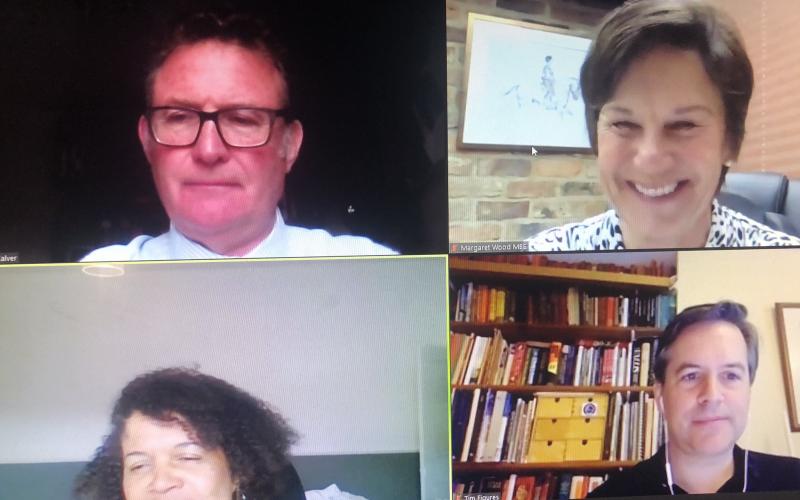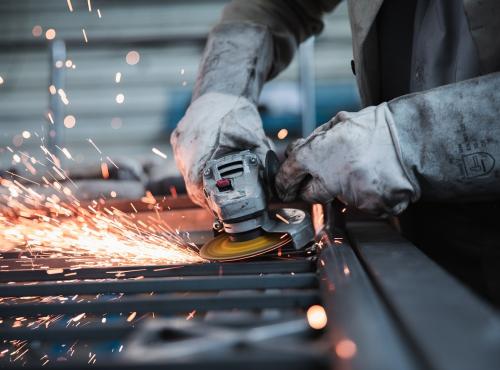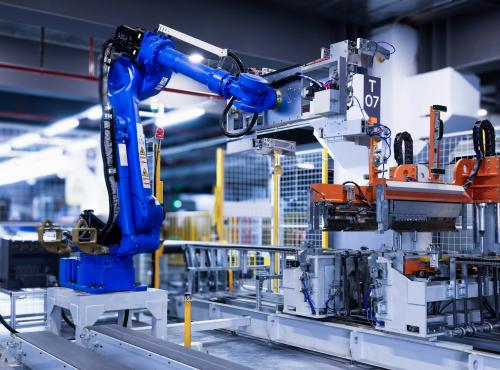APMG Holds Webinar on Building Resilience in UK Manufacturing
On Wednesday 8th July, the APMG brought together a distinguished panel of expert voices from across industry for a webinar chaired by APMG Co-Chair Mark Pawsey MP. The panel discussed what is needed for the manufacturing sector needs to ensure that it can drive the country through the COVID-19 recovery and weather any future storms.
The APMG's fourth webinar featured a panel of experts and leaders drawn from across the manufacturing sector, who addressed an audience from across the manufacturing and wider business community. Mark Pawsey opened the meeting, welcoming attendees and panelists and explaining that the webinar had been convened to give background and build knowledge around what is needed to help to build resilience in UK manufacturing.
The first speaker was Tim Figures, Director of Technology, Sustainability & Innovation at Make UK who presented on the role of technology, diversification and rightshoring in building resilience in the sector. Tim made the point that during the crisis most people have become aware of the importance of supply chains for the first time in their lives as panic buying placed significant pressure on supermarket supply chains, and that as a result the conversation around where things come from and who makes them has come to the fore. Tim noted that Make UK have found that only 15% of manufacturers have continued to work at pre-COVID levels, and that this denotes that it is not just sectors who have been forced to close that have been significantly impacted as a result of this crisis. He aslo made the point that in a number of sectors, an inability to access the parts and compenents required has ceased production. Tim welcomed the widened awareness of the sector that has arisen from the crisis and stressed the importance of ensuring that we increase flexibility across the sector, as the next crisis is unlikely to be exactly the same as this one. He also highlighted the importance of technology to reslience in the sector, such as the use of additive manufacturing as shown by its application in the ventilator challenge. He touched on the importance of diversification to ensure there are not single points of failure that can freeze supply as seen in sectors such as automotive during this crisis. Tim then spoke of re-shoring or "rightshoring" which means looking at shortening supply chains to ensure continuity of supply, but stressed that this is not a silver bullet but should be part of the wider mix. Finally, Tim called on government to roll out Made Smarter to enable digitisation in SMEs across the country, he also stressed the importance of adequately mapped supply chains in identifying need for single point supply and diversification. He also called for increased support for rightshoring where appropriate to guarantee supply.
Second to present was Dave Archer, Chairman Midland Manufacturing Network who set out the experience of the Warwick Manufacturing Alliance, a programme which has endeavoured to address PPE shortages at a local level. The first issue facing the group was understanding the demand - where and what. Onto this, the group then worked to understand the capability and capacity for addressing this shortfall with manufacturers of all sizes in order to find a route to orders. The group identified the suppliers, demand, relevent standards and supply opportunities in order to meet the challenge at a county level (Warwickshire County Council). A local partnership was formed including a number of stakeholder bodies including the university and APMG member Made in the Midlands and the IET Midlands Manufacturing Network to access the widest possible base of manufacturers. The procurement team of Warwickshire County Council were able to fund the manufacture of the PPE to meet the increasing demand through the crisis. The group also looked to end of life of product, considering how, whilst increasing supply, they might enable increased circularity in PPE. Dave explained that the model operated in Warwickshire offers potential for wider adoption to meet national challenges such as increased PPE demand at a local level whilst also increasing economic resilience, bolstering SMEs and providing high quality jobs. He also called for a national supply chain body which the group feel would have aleviated around 90% of the issues that arose around PPE shortages.
Third, attendees heard from Margaret Wood MBE, Founder ICW (UK) Ltd, Member of the MADE Smarter Review who welcomed the increased focus from government on SMEs, but stressed that the UK needs a new vision for manufacturing build around an effective innovation ecosystem to increase compeititive advantage and apply research and innovation in a modern, resilient and sustainable sector. Margaret explained that Made Smarter is not just about manufacturers, but about fostering the connectivity to facilitate the world class digital manufacturing solutions in the UK. She then covered the importance of thinking about digital technologies as part of an ecosystem that can help and enable buisnesses to develop and spoke of the importance of technology to reducing carbon emissions and stated that this is the next industrial revolution facing the country. Margaret spoke of the importance of a range of technology from AI to IOT and from Data Analytics to Robotics, which, when applied together with increased access to research, collaboraton, funding and networks can achieve innovation breakthroughs in businesses. She summarised by stressing the value that Made Smarter can add by creating a fully connected and dynamic manufacturing ecosystem which, if got right, can shape the world.
Finally, Paul Calver, IET Manufacturing Policy Panel member and Global Strategy Specialist presented on Supply Resilience in a Global Economy. He began by speaking about the importance of globalisation to product and material sourcing, stating that it has improved the standards of living in developed nations by cheapening goods and in developing countries by distributing wealth, and explained that over 1bn people have been taken out of poverty since 1999. He explained that globalisation has, however, not been a panacea, with environmental impacts and inequlities within and between countries also growing. Paul then highlighted the impact of connected risks - such as COVID-19 or the US sub prime mortgage crisis - where a local issue can spread rapidly, transcending national boundaries and having a rapid global impact. He demonstrated that currently the UK faces a connected risk in raw materials as Europe is heavily reliant on imported raw materials, which, combined with a global shock can cause impact through supply chains as demand profiles change rapidly. The companies who weather these challenges best are flexible, broad internatioal market offerings and strong cash reserves. He highlighted the heavy reliance of UK manufacturing on hubs such as Heathrow or the Suez Canal which when disabled, hit the sector hard. Paul then set out ways in which the UK can address these risks, highlighting the potential of government support of the buying of rightshored products as well as the importance of securing competitive material supply in future trade deals. However, Paul also explained that the supply of raw materials is not enough in the modern world, with global hubs and infrastructure also playing key roles in supply chain resilience. He also made the point that government procurement has a role to play in supporting the overcoming of connected risk. He summarised the presentation by stressing the importance of working internationally to mitigate the potential impact of connected risks and called on government to understand the problem, change company behaviour and collaborate internationally.
Following this there was an audience Q&A, with questions on how government can encourage industry to increase the uptake of technology, how imported goods can be held to the same standards as UK goods to ensure fair competition, the potential for an ISO9001 style accreditation or standard for business.
APMG Member Chi Onwurah MP summarised the discussion, highlighting the importance of action in this area, but also the opportunity provided by recovery from the COVID-19 crisis which is an opportunity to address the challenges we face as a nation. She stressed that if this opportunity is realised, the UK can address the recovery, the climate crisis, bring in emerging economies whilst also creating high productivity, high skill jobs which will allow the UK to compete in the right place in the value chain that we want to compete in.
The APMG will be convening several more webinars via Zoom to discuss the redeploment of skills and to reflect on the issues which have arisen from the current crisis.




